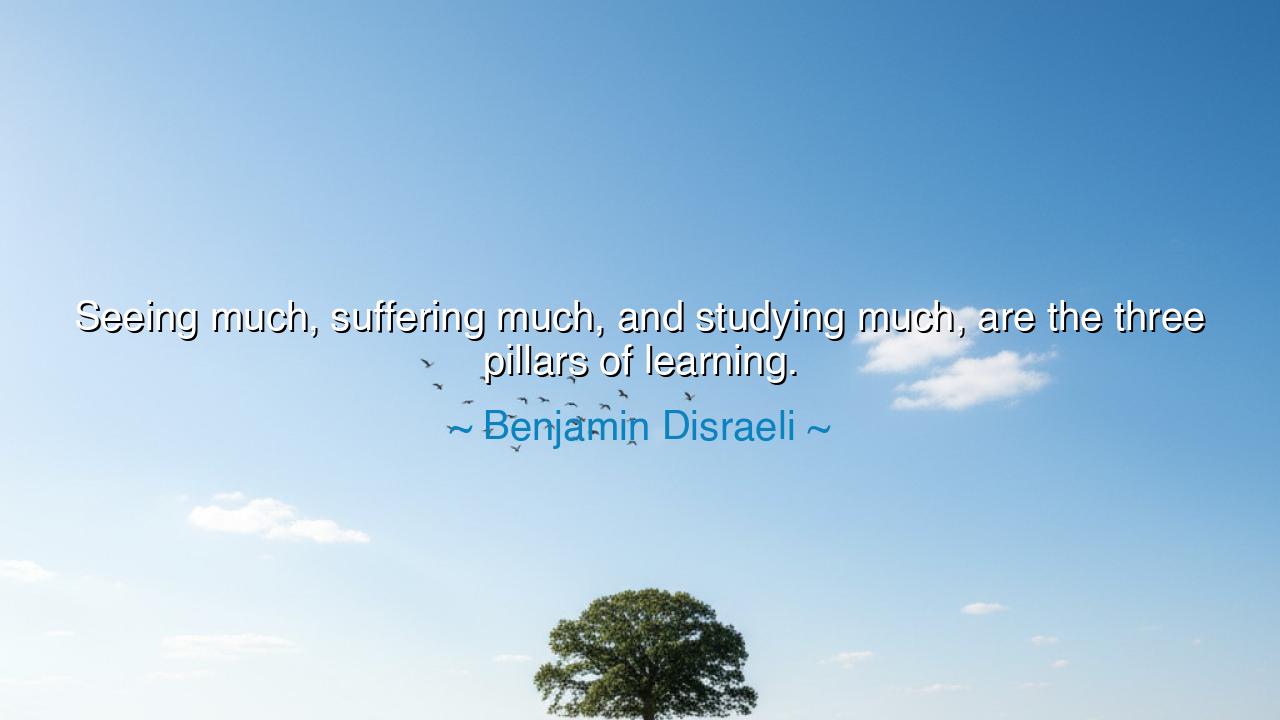
Seeing much, suffering much, and studying much, are the three






“Seeing much, suffering much, and studying much, are the three pillars of learning.” — Benjamin Disraeli
In this immortal saying, Benjamin Disraeli, the great British statesman, novelist, and philosopher of power, unveils the trinity upon which true wisdom stands. His words strike like an ancient bell, resonant and solemn, reminding us that the road to understanding is neither swift nor easy. To learn deeply is not merely to read or to listen, but to live — to see, to endure, and to reflect. The human mind is not made wise by ease, but by experience tempered through struggle and contemplation. Knowledge begins with observation, deepens through suffering, and matures through study. These are the three sacred stones upon which the temple of learning is built.
The origin of this wisdom lies in Disraeli’s own life, a journey marked by brilliance, rejection, ambition, and transformation. Born to a family of outsiders, he faced ridicule and doubt, yet rose to become one of Britain’s most influential prime ministers. He saw much — the corruption of politics, the vanity of wealth, the changing tides of empire. He suffered much — the sting of prejudice, the loneliness of vision, the burden of leadership. And he studied much, mastering not only the laws of statecraft but the laws of the human heart. From these fires, he forged his insight: that learning is not confined to books, nor to classrooms, but found in the full breadth of living — in the eyes that see, the heart that breaks, and the mind that seeks to understand.
To see much is the first pillar. It means to open one’s eyes to the vast theater of life — to watch the rise and fall of men, to observe nature’s patterns, to notice the joys and injustices that shape the world. The one who truly observes learns without words. The wise of old, like Herodotus and Marco Polo, became historians not through privilege but through travel, through seeing lands and peoples unknown. To see much is to become humble before the immensity of existence. It broadens the spirit, dissolving ignorance and prejudice, and teaches us that the world is not as small as our certainties. The first step of learning, then, is vision — not the kind that looks, but the kind that perceives.
To suffer much is the second pillar, and the most sacred. For suffering, though bitter, is the furnace in which the human spirit is refined. Pain teaches what pleasure never can — the value of endurance, the depth of compassion, the frailty of pride. The ancients called this the “school of affliction,” where the soul learns its truest lessons. Job, in his trials, learned the limits of human understanding and the vastness of divine mystery. Helen Keller, blind and deaf from infancy, found in her suffering not despair but the gift of perseverance and empathy. From darkness, she drew light; from limitation, she gained vision. So it is with all who would be wise — suffering is not a curse, but a teacher veiled in shadow.
The third pillar, to study much, completes the foundation. For while sight gives us experience and suffering gives us depth, study gives us clarity. The mind must be trained to interpret what the eyes and heart perceive. To study is to gather the scattered fragments of life and weave them into meaning. It is not confined to the reading of books, though books are sacred vessels; it is the constant effort to question, to analyze, to connect, and to grow. As Socrates taught, the unexamined life is unworthy of man — for without study, experience becomes chaos, and suffering becomes despair. Study transforms both into wisdom.
Together, these three — seeing, suffering, and studying — form the sacred triangle of learning. Remove one, and the structure collapses. The one who sees but never reflects becomes shallow; the one who studies but never suffers becomes arrogant; the one who suffers but never learns remains lost in pain. Only by embracing all three can one ascend the mountain of understanding. The truly wise are those who have looked upon the world, felt its sorrows, and sought its meaning with patience and humility.
So, dear seeker, take this teaching as your compass. Do not flee from experience, for it is the ground of wisdom. Do not curse your suffering, for it will deepen your soul. And never cease to study, for it will illuminate the path when all else grows dark. See the world with open eyes; bear its trials with open heart; contemplate its mysteries with open mind. For the one who sees much, suffers much, and studies much has lived not in vain — they have earned the crown of true learning, and through them, the world itself becomes wiser.






AAdministratorAdministrator
Welcome, honored guests. Please leave a comment, we will respond soon